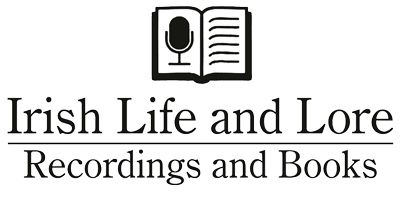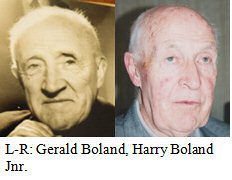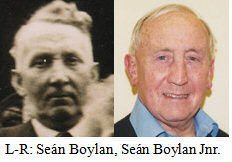Cáit Nic Ionnraic’s great-grandparents emigrated from Ireland to the East End in London during the Famine, and she explains that her father, John O’Connor, was brought up in the Irish culture in the area. He became a member of Conradh na Gaeilge and the Irish Volunteers in London and came to Dublin on 15th January 1916. Cáit explains that an old mill on Count Plunkett’s property at Larkfield in Kimmage was made available to him and others who were coming from England and Scotland at this time. John’s brother Joe was to come came to Ireland later, possibly during the War of Independence. She recounts an anecdote about the Zeppelins in London during WWI. John O’Connor’s anger that their attack might kill his mother ignited in him a passion that his sister helped to direct towards the Irish cause rather than against the Germans. She explains that some suspicion existed in relation to the genuine intentions of the men from London who were based in Larkfield and attached to the Kimmage Garrison. A document is examined relating to the Irish Volunteers South London District Committee, and Cáit explains that there were groups in London, Liverpool, Edinburgh and Manchester. She describes the actions of the Kimmage Garrison in preparation for Easter Week. On Easter Saturday the men were told to go to Mount Argus Church at Harold’s Cross for confession, and were given money to buy suitable boots. On the Tuesday John O’Connor was given orders to go across O’Connell Street from the GPO to Reis’s building where was based a Marconi school of telegraphy. These schools had been closed by the British authorities in 1914, but being an electrician, John mastered the workings of the equipment. A message was sent out that a rising was in progress. Cáit reads from her father’s memoir an account relating to this episode. She remembers her father talking about this period with visitors to their home, some of whom are recalled. One visitor was Fr Heuston, and recalled is a discussion about renaming Kingsbridge Station in memory of his brother, Seán Heuston. Another visitor, Mick Cremin, discussed with her father the plan for the O’Donovan Rossa memorial stone in St Stephen’s Green. Following the Rising, John O’Connor was arrested, interned at Frongoch and released in December 1916. Cáit reads her father’s account of the men’s arrest, detention at Richmond Barracks and the march to the quays to take a cattle boat for England. He was held at Stafford Prison initially and he lists his co-prisoners there. Sometime later the men were taken to Frongoch in Wales, where he acquired the nickname “Blimey” which was to stay with him throughout his life. Cáit reminisces about a visit she made to Wales in 1957when she saw the site of the internment camp. She reads from her father’s memoir about the activities of the contingent from England and Scotland after their release. She explains that her father later supported the anti-Treaty side. He was very friendly with two other men from London, Ernie Nunan and Joe Good. Ernie and John took the opposing side to Joe, who supported Michael Collins. Cáit examines a photo of the three men, and she explains that her father mended the relationship with Joe Good many years later. Both Ernie and Joe were to become frequent visitors to the O’Connor home. Cáit is aware that during the Civil War her father spent some time in Kerry, and she says that this period was rarely spoken about as some terrible things had happened. She recalls her father’s happy and generous character and describes some of the activities he engaged in at Frongoch and at Tintown in the Curragh. John O’Connor married Kathleen Kavanagh whose two brothers, Michael and Liam, were based at Boland’s Mills during the Rising. Kathleen Kavanagh carried messages at this time. The family were from the Pleasant Street area and were to eventually settle in Rathgar. As far as Cáit is aware, her parents met at a Gaelic League Céilí where John would often play the piano. John O’Connor’s autograph book is described. After their marriage in Dublin in the late 1920s, he and Kathleen lived in England where he worked as an electrician for about one year, during which time Kathleen returned to Dublin for the birth of their first child. Shortly after, John secured a post with the ESB and the family settled in Tipperary. The close friendship of John O’Connor, Ernie Nunan and Joe Good is described, and Cáit remembers hearing of the death of Joe Good and recalling her parents from holiday to attend his funeral. The types of people who took part in the Rising are discussed, as is the Old IRA military pension. The promise of Home Rule and its postponement by the Great War is considered, and the historical context and the reasons why men joined up during the war are discussed. Cáit O’Connor married Pádraig Mac Ionnraic, son of Frank Henderson. She recalls the fact that during her early childhood her father explained to her how fortunate she was that she would learn Irish in school. Later she attended céilithe and joined Conradh na Gaeilge, competing at féiseanna. At age 16 she met her future husband at the Mansion House féis. Irish being the customary language at such events, it was some time before she knew his name in English (Henderson). She speaks about her brother-in-law, Leo Henderson, and her husband’s memories of him. Cáit’s work as a secretary at Croke Park with Páidín O’Keeffe and Seán Ó Siocháin is discussed. She explains how she became the family custodian of her father’s papers. He had spoken with his son-in-law, Pádraig Mac Ionnraic, about his history. She remembers that her brother Seán used to go with their father to events such as the commemorations at Arbour Hill and the gatherings of the 1916-21 Club. The London-Irish Club met at Craobh Mobhí on Parnell Square and Cáit recalls these meetings. Joe Good’s brother Tom is remembered, and Cáit reflects on the men who decided to fight for their country, and what she describes as tír-grá. An event that took place at a wedding in the 1920s, when a man in uniform placed his gun on the dining table, is recalled. Cáit notes the importance of remembering her parents’ efforts in the cause of Irish freedom.

Cáit Mhic Ionnraic
Cáit Mhic Ionnraic
€10.00 – €20.00
Additional information
| Type: | MP3 |
|---|---|
| Audio series: | The 1916 Rising Oral History Collections |
| Bitrate: | 128 kbps |
| Download time limit: | 48 hours |
| File size(s): | 55.70 MB |
| Number of files: | 2 |
| Product ID: | CD191602-115 |
| Subject: | John Thomas O’Connor (father) |
| Recorded by: | Maurice O’Keeffe – Irish Life and Lore |








